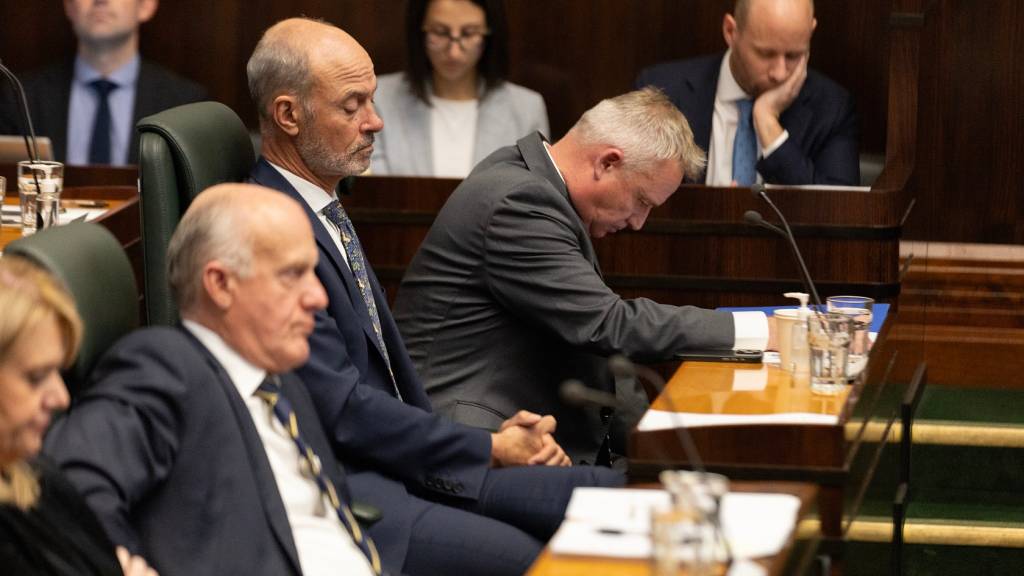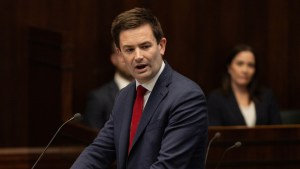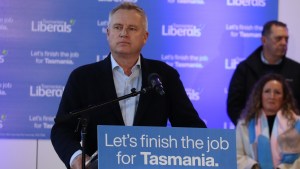A full month after Tasmania’s snap election in July, the new political reality has finally been made clear this week.
Liberal Premier Jeremy Rockliff survived another motion of no confidence on day one of the new parliament. But it’s less an endorsement of him, and more a rejection by the Greens of the bizarre political games played by Dean Winter’s Labor Party. Now Winter’s been replaced — everybody say “hi” to Josh Willie — leaving Rockliff to govern in minority. He has insufficient support on confidence and supply, and faces a crossbench that’s almost as big as his own party.
It looks messy. But how bad is it, really?
Related Article Block Placeholder
Article ID: 1218041
According to Bill Browne, director of the democracy and accountability program at The Australia Institute, this minority arrangement is actually fine, for the most part.
“There’s nothing in the Westminster system that says that a government needs formal confidence and supply agreements with the crossbench or anyone else. They’re neither necessary nor sufficient for stable government,” says Browne.
Independent. Irreverent. In your inbox
Get the headlines they don’t want you to read. Sign up to Crikey’s free newsletters for fearless reporting, sharp analysis, and a touch of chaos
By continuing, you agree to our Terms & Conditions and Privacy Policy.
Indeed, Rockliff had a confidence and supply deal with Jacqui Lambie Network MPs after the March 2024 election that ultimately fell apart, leading to the vote of no confidence against him in June. No deal, no matter how formal, is binding, which is “kind of the point” of having parliament to keep the executive accountable.
“The government of the day has to treat maintaining confidence as something they do actively,” Browne says, pointing to leaders who have been able to govern productively without formal supply commitments. The confidence and supply status for Julia Gillard’s 2010 minority government went through ebbs and flows throughout her term. This did not stop her from leading the most productive federal government in history.
In state politics, former Greens leader Christine Milne told a panel event in Hobart that she introduced legislation to repeal Tasmania’s anti-homosexuality laws back in 1997, which Labor had shied away from for fear of alienating conservative rural voters. As the Greens held the balance of power, Liberal premier Tony Rundle told Milne that if she could convince the lower house to pass the bill, he would instruct the upper house Liberals to do the same. “Both Liberal and Labor were very pleased that it was my private member’s bill because the Greens got the blame for it. I’m very happy to have the blame for it!”
In the ACT in 2020, truth in political advertising laws were raised by Greens crossbencher Caroline Le Couteur and were passed with unanimous support from the Labor government and Liberal opposition — another example of what Browne calls “legislating from the crossbench” that presents more opportunity than it does challenge.
Related Article Block Placeholder
Article ID: 1214803
If either major party has the appetite they could work with the strong crossbench in both lower and upper houses to pass — and take credit for — progressive policy like truth in political advertising laws, reforming the integrity commission, bolstering right to information laws. “These policies are within the grasp of the Labor Party, if it’s serious about pursuing it,” Browne explains.
The worst case scenario in Tasmania is not instability but a government that refuses to collaborate at all, creating a logjam and potentially sending voters back to the polls again. The fear of public opinion on this is almost certainly why Rockliff has begun making some promises to the Greens and progressive independents, including a review of the salmon industry, phasing out greyhound racing, and dropping a plan to open up more native forest for logging. Good will, and all that.
It takes two houses to tango on policy, and Tasmania’s upper house is equally important to understand. The 15-seat Legislative Council is made up of three Liberals, three from Labor, one Greens, and eight independents. The crossbench outweighs the Labor and Liberal parties combined, which means the major parties cannot work together to pass even the legislation they agree on (like, say, an AFL stadium).
Independent council member Meg Webb says the top priority of this government must be a structural reform of Tasmania’s finances “beyond the annual budget cycle”, developed with involvement of both houses of parliament.
“The Legislative Council is well-positioned to continue its scrutiny of the executive,” Webb says. With a strong crossbench in both houses, she believes this parliament represents an opportunity to seize upon good ideas no matter where they come from. But it does require the Liberal government — and Labor, with its de facto opposition status — to operate in good faith.
What will prove to her that Rockliff is open to the opportunity? “[He] must include the Council MLCs, particularly the independent members, in any discussions and consultations as he does the Assembly MPs, rather than treat the upper house as a rubber stamp,” she explained. “Too often the upper house was completely left out of discussions regarding legislative priorities, policy briefings or other matters, or were informed as a fait accompli.”
In a collaborative gesture for the upper house, Rockliff has appointed independent Tania Rattray as the leader of government. While he put a “Stability Agreement” to the lower house crossbenchers that touches on some of the elements Webb would like to see, how he intends to work with the upper house this time around remains to be seen.
Related Article Block Placeholder
Article ID: 1209900
There are rumours — and I can’t stress enough, just rumours — that new Labor leader Josh Willie might go back to the Greens to negotiate for their support again, pick up three independents and “steal” minority government from Rockliff’s Libs. The idea is that Willie from the Labor’s left faction will curry more favour with the Greens and progressive indies than Winter could from the right. Labor cannot form government without the Greens.
John Curtin did it to Robert Menzies in 1941, although one might argue that Tasmanian politics has not yet reached the crisis levels of World War II.
“Whether you’d see that happen so early in this new term, or what the Premier in consultation with the Governor would make of it, I’m not sure,” Browne says. “But it wouldn’t have to be right away either – [it might only come] after the Rockliff government is given some time, and fails to address the environmental, budgetary and integrity concerns that the crossbenches staked their election on.”
This ride is not over yet.
Should Tasmanian Labor try to form government with the help of the Greens?
We want to hear from you. Write to us at letters@crikey.com.au to be published in Crikey. Please include your full name. We reserve the right to edit for length and clarity.




